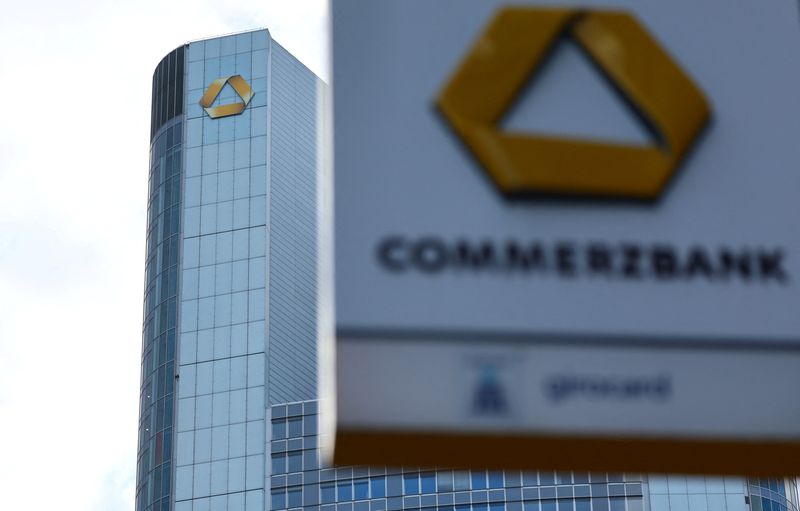By Elisa Martinuzzi, Christian Kraemer and Tom Sims
LONDON (Reuters) -Five years after Deutsche Bank and Commerzbank (ETR:CBKG) aborted an attempt to merge, an uncertain outlook for bank profitability and Germany's need to plug a hole in its budget have rekindled speculation about a potential deal.
Germany has said it is looking at all options to raise funds by selling stakes in some of the 100 or more companies it owns.
Though a sale of its remaining 15% holding in Commerzbank is not imminent, Finance Minister Christian Lindner is open to a disposal and ultimately would prefer the government exiting the stake, according to a person familiar with his thinking.
A merger with Commerzbank would allow Deutsche Bank to further diversify away from volatile investment banking earnings, bolstering its longer-term stability, another factor that could sway the German government, said the person, speaking on condition of anonymity.
Deutsche Bank, which has completed the bulk of a multi-year restructuring plan, has recently stepped up internal discussions on deals, including possible purchases of banks such as Commerzbank and ABN Amro, Bloomberg News reported on Friday, without naming sources.
Deutsche Bank in recent months has come closer to reopening the idea of a merger with Commerzbank, even if there are no live discussions, a second person with knowledge of the situation has told Reuters.
Germany's stake in Commerzbank dates back to the global financial crisis of 2008 and is still loss-making for the government.
In an emailed statement on Monday, a German finance ministry spokesperson said no decision had been made on the government exiting its Commerzbank stake, and if it did the proceeds from such a sale would not flow into the federal budget.
A spokesperson for Commerzbank declined to comment.
Deutsche Bank declined to comment.
Commerzbank shares were up 1.5% at 11.52 euros at 1348 GMT, against a 0.39% decline in Germany's benchmark index and making it the top gainer among European banking stocks. The bank has a value of just over 14 billion euros ($15.35 billion).
Deutsche Bank shares were down 0.65% at 11.97 euros, valuing the bank at 25 billion euros.
"The rise and normalisation of interest rates will refresh overdue consolidation plans," said Beat Wittmann, chairman of Porta Advisors, a Swiss boutique advisory firm.
"In Europe, domestic deals are still easier than international ones," adding that pressure on Germany to raise money could be a catalyst. A combination would be complicated by Deutsche Bank's low valuation, assets that would need to be marked down and could lead to painful job cuts to reap the benefits of combining overlapping businesses. It trades at a fraction of its book value.
Deutsche Bank Chairman Alexander Wynaendts said in November the company wanted to be ready for M&A if the opportunity arose.
"The chances of a sizeable transaction are relatively low in the near term given the many hurdles," Anke Reingen, an analyst at RBC Europe, wrote in a note to clients on Saturday.
But press speculation and previous comments by the bank have increased the likelihood of a move, she said.
According to documents from the German finance ministry seen by Reuters, the government plans to raise up to 4 billion euros this year by selling company stakes. The money would be funneled into Deutsche Bahn, the state-owned rail company.
Sueddeutsche Zeitung on Dec. 28 reported that Germany had hired an investment bank to review the Commerzbank stake, without identifying the adviser.

Commerzbank has also long been seen as a potential partner for UniCredit, which is already present in Germany through HVB, and the two reportedly held merger talks before Russia invaded Ukraine in 2022. A spokesperson for UniCredit declined to comment.
($1 = 0.9133 euros)